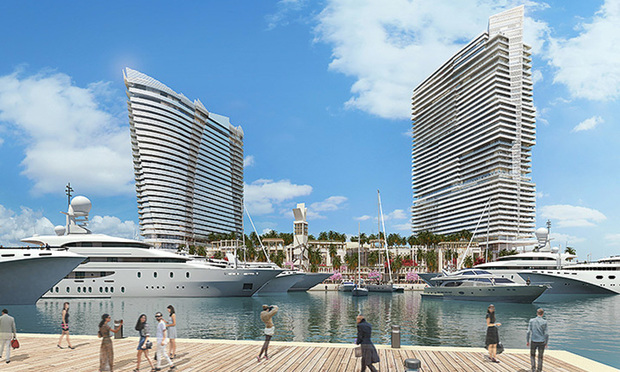 Rendering of Flagstone Island Gardens project for Miami's Watson Island.
Rendering of Flagstone Island Gardens project for Miami's Watson Island.
A yearslong deadlock between Miami and the developer of the city-owned Watson Island ended with an agreement to settle a lawsuit for $20 million.
The City Commission voted Thursday to settle Flagstone Island Gardens LLC's lawsuit, essentially restarting a redevelopment plan for the island along MacArthur Causeway that started 18 years ago.
Flagstone Island Gardens, led by Mehmet Bayraktar, wants to resume its plan for two hotels, retail and a garage on the northwest side of the island. It already has built a 50-slip megayacht marina and restaurant space, where The Deck recently opened.
City Commissioners Joe Carollo and Manolo Reyes said they reluctantly approved the settlement.
If the litigation went on, Flagstone could have claimed nearly $200 million in damages, said the developer's attorney, Eugene Stearns, a shareholder with Stearns Weaver Miller Weissler Alhadeff & Sitterson in Miami.
Under the agreement, the city will pay $5 million up front and $2.5 million in the next fiscal year and the year after. The city also would erase $10 million in rent that otherwise would be due over 10 years.
Reyes said it's misleading to say the settlement value is only $20 million.
“I want, for the record, people to know that there are changes here that could have long-term economic impact. We are extending the construction of a hotel by five or six years, and we are not requiring that hotel to be built in a shorter time,” he said. “That is funds that are not coming in to us in the way of taxes or percentage revenue.”
The stalemate happened after Flagstone accused the city of not signing off on a parking tweak even though city staff members said the change was minor, could be done administratively and made the project better.
The major use special permit change called for the redesign of a seven-story garage to make it less conspicuous by making the structure shorter and spreading parking around the project's footprint.
The city also raised issue with Bayraktar's written statements that he hadn't secured financing but could finance the project himself.
Things heated up in 2017 when the City Commission voted to suspend the development by declaring Flagstone was in default for failing to begin hotel and retail construction by an April 30, 2017, deadline.
Flagstone responded with a lawsuit and won in court last year when Miami-Dade Circuit Judge William Thomas said the company had complied with agreements and started work by deadline.
Thomas also appeared to side with Flagstone on its claim that the true reason the permit was held up was due to political pressure from an opposition group. The Coalition Against Causeway Chaos wrote several letters to the city opposing changes.
“CACC was quite effective. In fact, the City Commission, which is supposed to play an appellate role in the modification process, suspended the normal administrative process, as it relates to Flagstone, and decided that the commission, rather than the Planning and Zoning Department, would review applications related to Flagstone,” the judge wrote.
Plans call for a 535-foot hotel with 305 rooms, including 105 timeshares, and a 375-foot hotel with 300 rooms. The retail portion would be 221,000 square feet, and the parking garage would be up to three stories high with 1,500 spaces.
“We want this project finished,” City Manager Emilio Gonzalez said.
Related stories:
$20M Settlement Would Revive Miami's Stalled Watson Island Makeover
Watson Island Developer Wins Case Against Miami, Plans to Seek Damages
© Touchpoint Markets, All Rights Reserved. Request academic re-use from www.copyright.com. All other uses, submit a request to [email protected]. For more inforrmation visit Asset & Logo Licensing.







